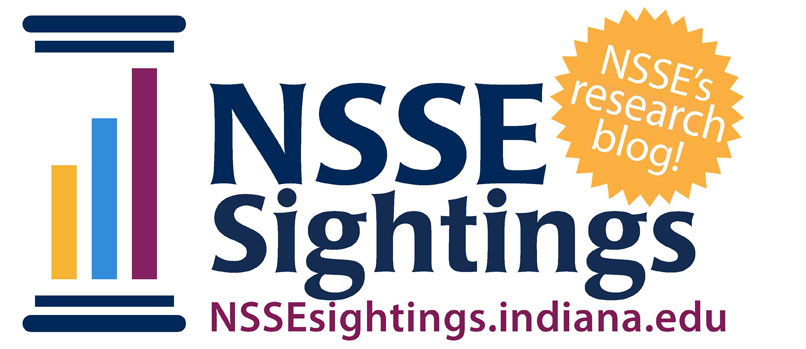In a recent issue of the Journal of Computing in Higher Education, NSSE Research Scientist Angie Miller and University of South Florida Associate Professor Amber Dumford authored an article looking at how online learning impacts student engagement.
Both authors were interested in this topic after having taught online classes themselves. Teaching through this medium has its own sets of struggles, for both students and teachers, but it can also offer unique opportunities. Previous research is mixed, with some studies noting a positive impact on student engagement. However, most of these focus on a single course, rather than the overall student experience. Therefore, the authors wanted to further investigate whether online learning is influencing engagement, moving beyond personal anecdotes and into the empirical data.
The data used in this study were from the 2015 NSSE administration. Responses were available from over 300,500 first-year and senior students attending 541 baccalaureate-granting institutions, with a variety of institutional and demographic characteristics. This study focused on the item that asks students to report the number of courses they are taking in the current term, and the follow-up item asking how many of those courses are entirely online. Using those two items, a "percentage of courses online" variable was calculated. The study also incorporated the ten Engagement Indicators, as well as several of the demographic items.
A set of regression models (run separately for first-year and senior) with each of the Engagement Indicators as the outcome looked at the impact of percentage of online courses. Because many other institutional and demographic characteristics can play a role in both online learner status and student engagement, these models also controlled for gender, transfer status, enrollment status, first-generation status, age, SAT/ACT, major, race/ethnicity, grades, institutional control, and institutional size.
The results indicate that for first-year students, percentage of online courses was positively associated with Quantitative Reasoning (? = .013), meaning that the more online courses in which the student was enrolled, the higher the score on the Quantitative Reasoning EI. Conversely, percentage of online courses was negatively related to Collaborative Learning (? = -.025), Discussions with Diverse Others (? = -.011), and Quality of Interactions (? = -.019) for first-years (i.e. the higher the percentage of online courses, the lower the EI score). Some, but not all, of these same patterns were found for seniors. Specifically, for seniors, the percentage of online courses was negatively related to Collaborative Learning (? = -.087), Discussions with Diverse Others (? = -.013), Student-Faculty Interaction (? = -.048), Effective Teaching Practices (? = -.022), and Quality of Interactions (? = -.012).
In general, the findings suggest that an online environment might benefit certain types of engagement, but may also be somewhat of a deterrent to others. Given the results, faculty and institutional administrators may need to take extra steps to guarantee an equitable learning experience for online students when it comes to student engagement. This might include better utilization of existing course management options, expanded opportunities for less formal/restrictive interactions with faculty and classmates, incorporation of video components if technology allows, and institutional support for pedagogical training that specifically addresses teaching online.
Full findings from this study were published in the December 2018 issue of Journal of Computing in Higher Education.
Dumford, A.D., & Miller, A.L. (2018). Online learning in higher education: Exploring advantages and disadvantages for engagement. Journal of Computing in Higher Education, 30(3), 452-465.


